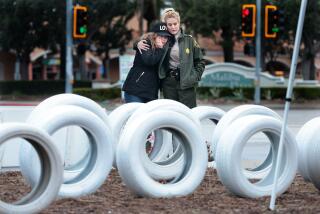Bill Gains; Would Help Drivers Told to Pull Over
- Share via
SACRAMENTO — The Assembly approved legislation Wednesday that would allow drivers being pulled over by police to proceed a “reasonable distance” to a safe spot before stopping.
The measure, by Assemblyman Larry Stirling, is in response to charges against a former California Highway Patrol officer in the 1986 slaying of San Diego State University student Cara Knott and a second case in which a Jamul woman was arrested by sheriff’s deputies for failing to stop on a back-country road until she reached the lighted parking lot of a convenience store.
Stirling, a San Diego Republican, said those two cases and others demonstrate that the law needs to be changed to allow drivers more freedom to decide where they should stop for police.
He said police “want the authority to pull you over any place, any time, for any reason,” but he said motorists should not be forced to stop where they feel their lives might be in danger.
Under the measure, which was approved on a bipartisan 44-27 vote and sent to the Senate, a driver ordered to pull over would be able to “proceed a reasonable distance to the first available place of safety before stopping” if the motorist first signaled the intent to stop.
The bill defines a “place of safety” as a spot “with adequate lighting if at nighttime, far enough from traffic lanes for personal safety, and not unnecessarily remote or inaccessible.”
Stirling predicted that the bill could be implemented without much change in current practice. He said in most cases, officers already direct motorists to a safe, lighted place.
“I think this is a fair item of necessity to allow the people of California to make that balance between their law enforcement officers’ rights and safety and their own personal safety,” Stirling said.
Assemblyman Paul Zeltner (R-Lakewood) argued that the bill, which has been opposed by law enforcement agencies throughout the state, would needlessly place officers in jeopardy. He described the nighttime stop as “one of the most dangerous situations” that an officer can face.
More to Read
Get the L.A. Times Politics newsletter
Deeply reported insights into legislation, politics and policy from Sacramento, Washington and beyond. In your inbox twice per week.
You may occasionally receive promotional content from the Los Angeles Times.










